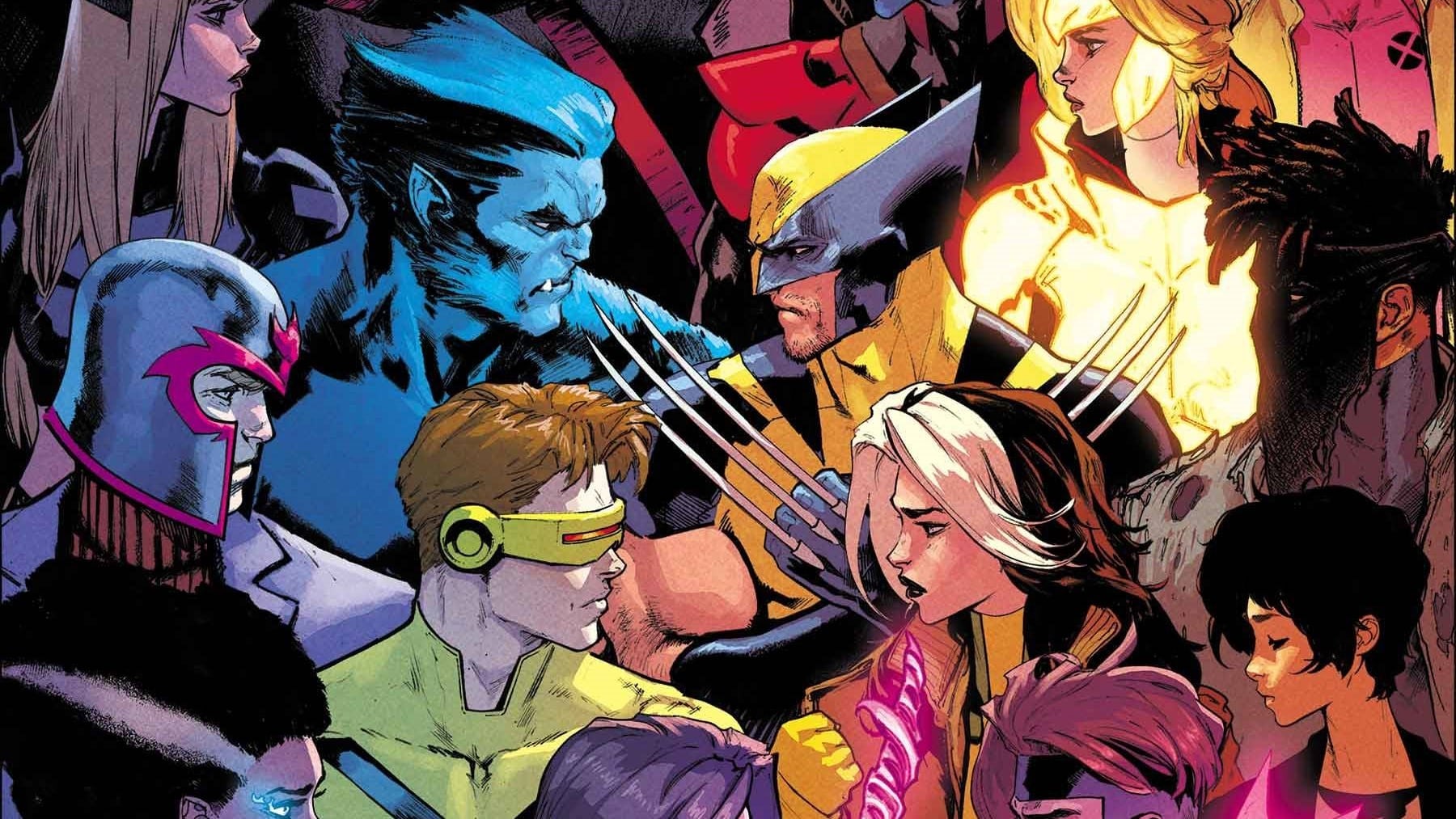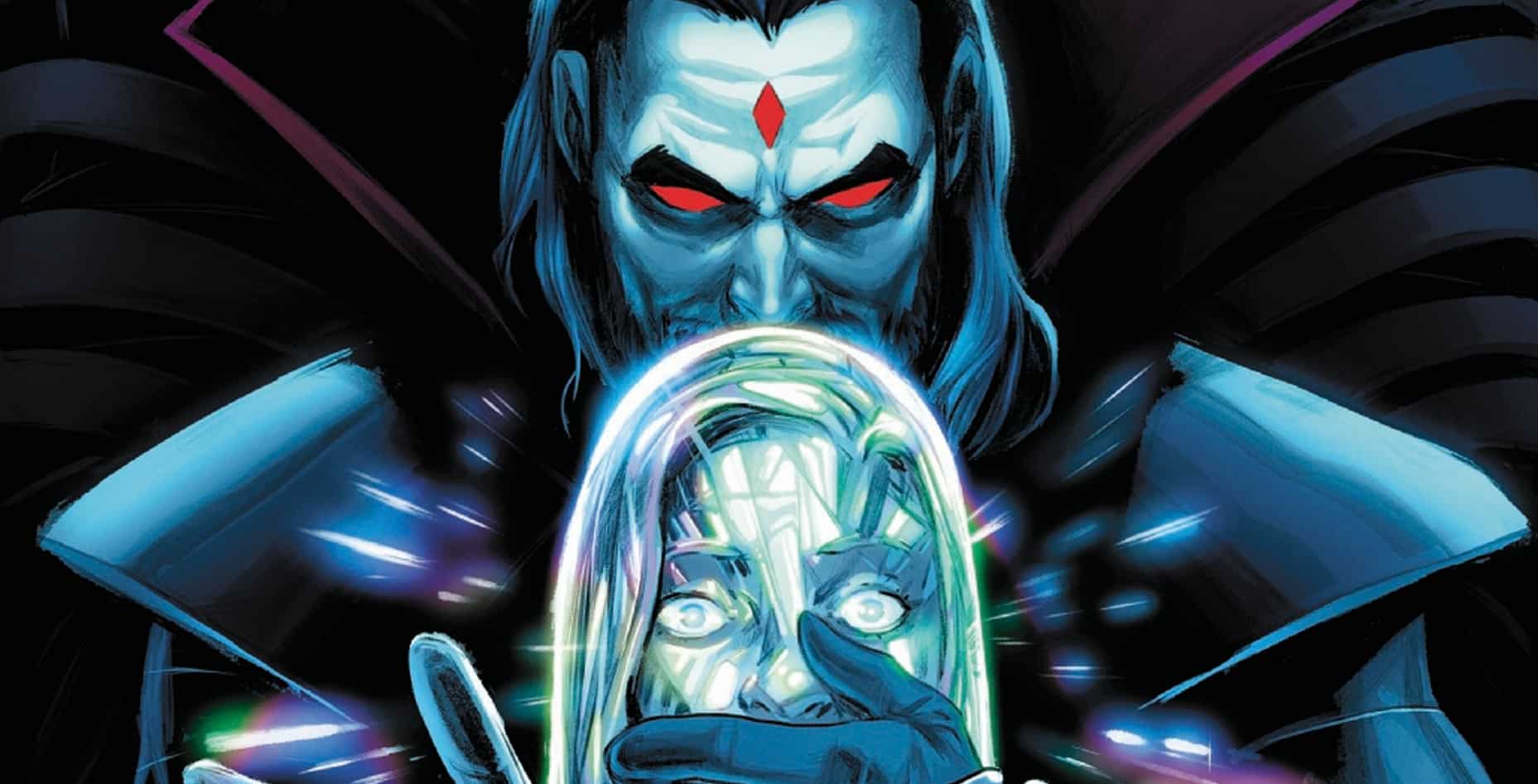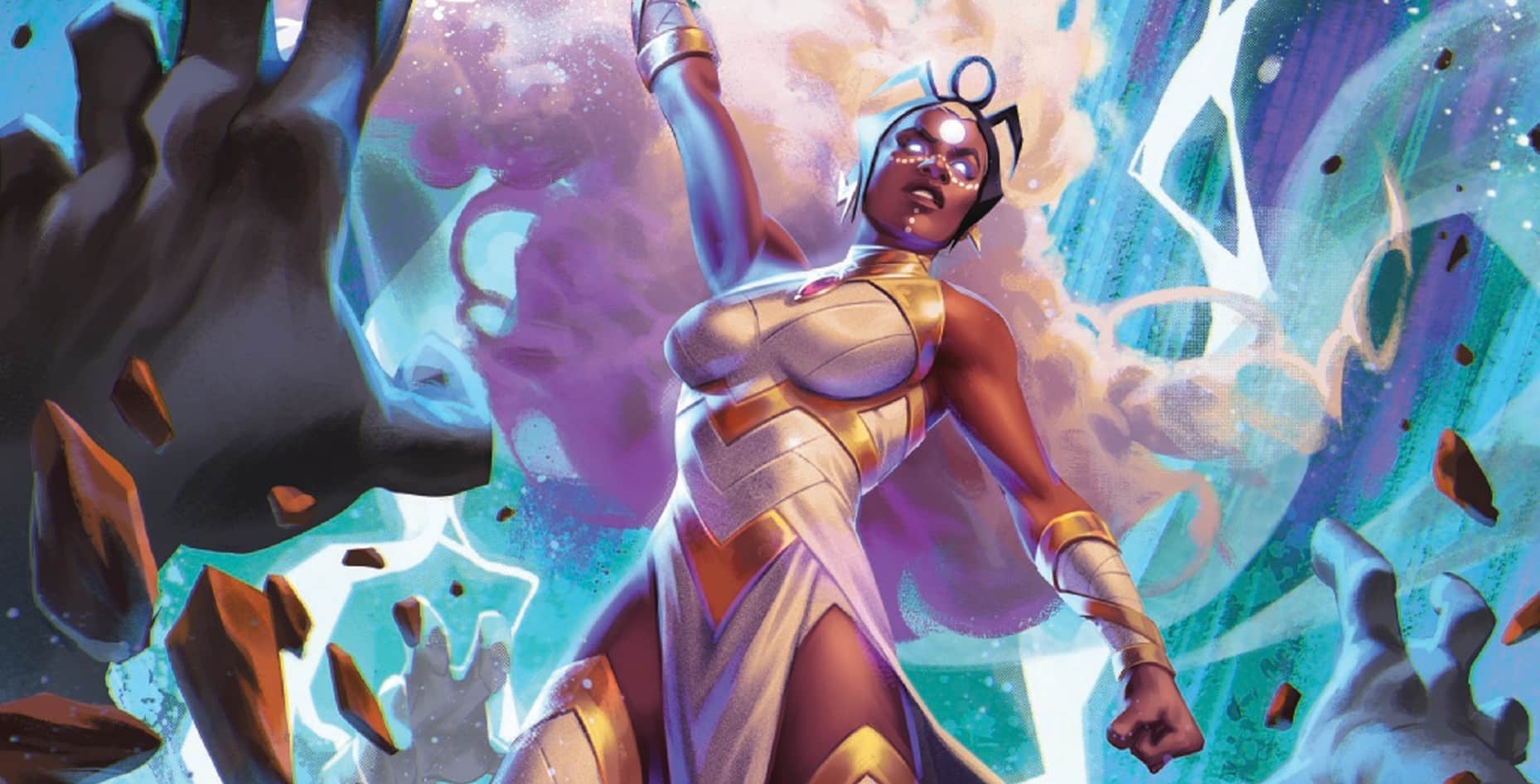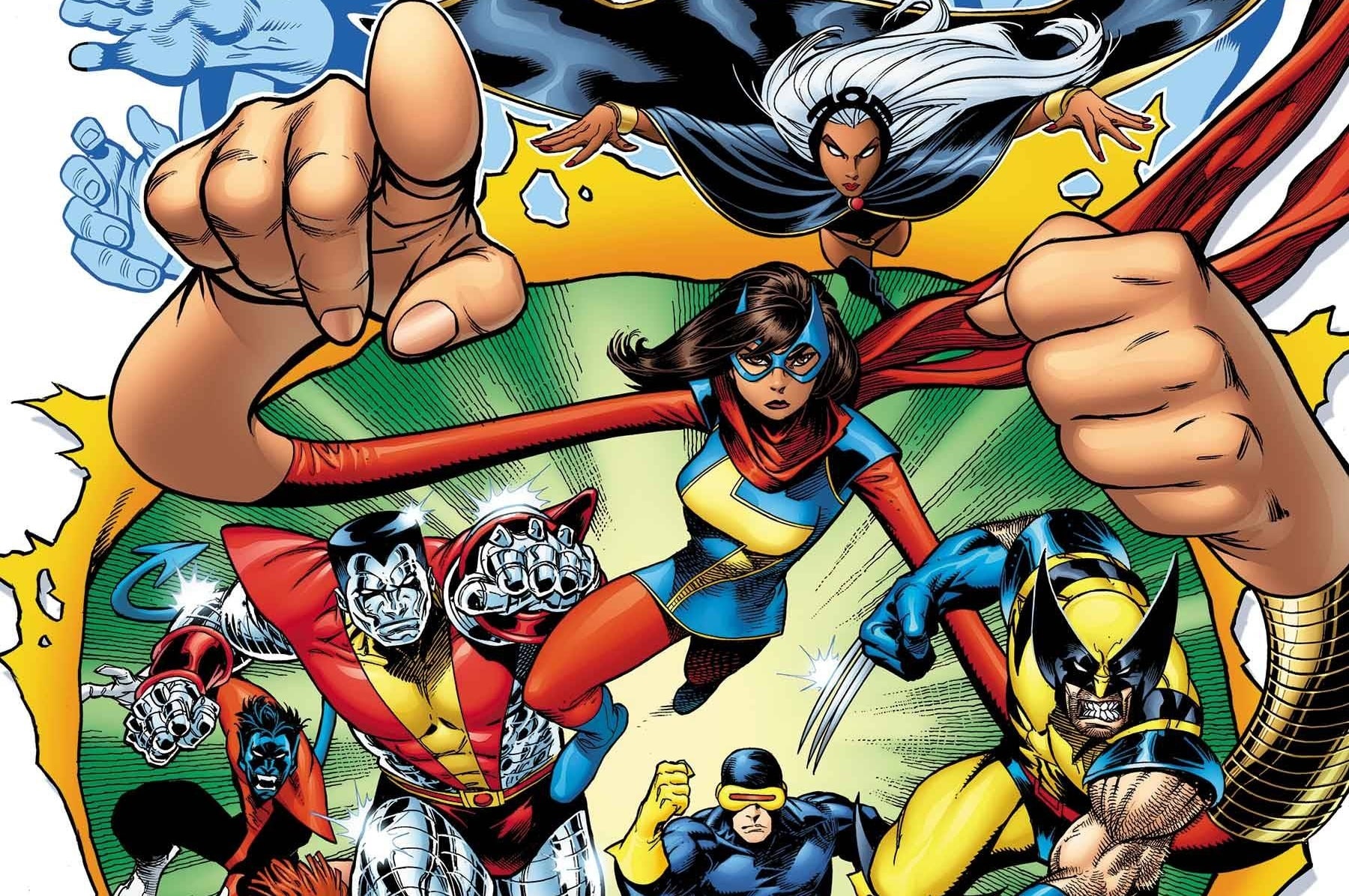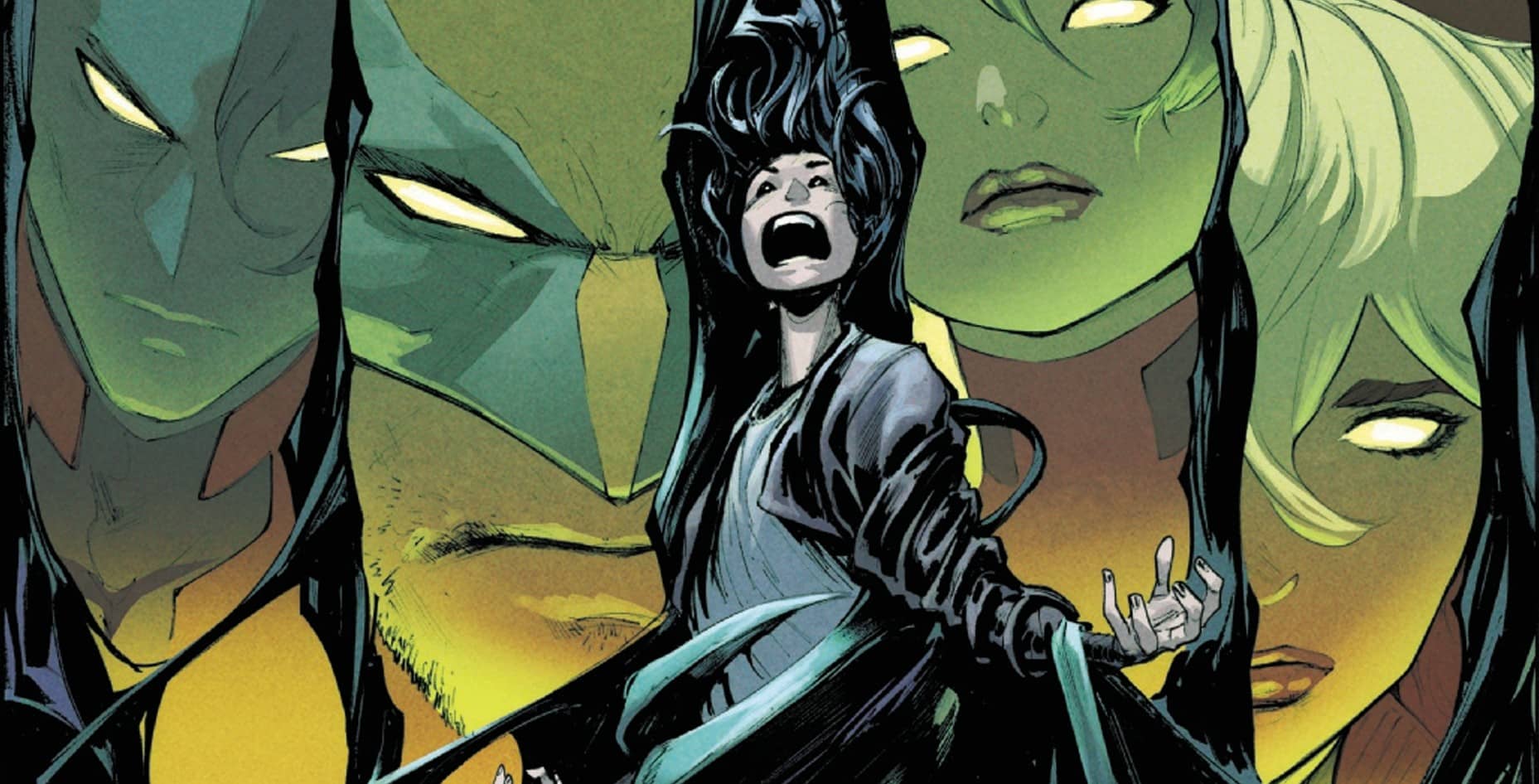The Raid on Graymalkin continues as two conflicting teams of X-Men come to a crossroads at the former Xavier Institute. As if the Perimeter protocols and the prison’s mutant Trustees weren’t enough, team leaders Rogue and Cyclops find themselves at war over the uncertain legacy of Charles Xavier. Uncanny X-Men #7 is written by Gail Simone, penciled by David Marquez and Edgar Salazar, inked by Marquez and Victor Olazaba, colored by Matt Wilson and lettered by Clayton Cowles.
Jake Murray: The gloves are well and truly off for this one. Yes, that’s right, it’s me, Jake Murray, vs. friend and colleague Anna Peppard in what our editor is insisting we call the grudge match of the century. [Dan Grote: Wait, I didn’t —] Well, well, well Anna — you finally decide to stop draggin’ your feet and come dancin’… and right away, you go steppin’ on our … ooh is that Charles Xavier?
Anna Peppard: Finally, our long-seeded interpersonal conflicts come to a head in the form of the forceful flinging of ambitious adjectives in the broad vicinity of the disenchantingly desultory rising action of this already-interminable tetralogy. Or to put it another way — me and Jake aren’t fighting, except with this comic. But maybe we’re not even doing that, because, like Rogue and Scott, I’m struggling to find a reason to care about fighting, except with my waning enthusiasm for this storyline. Yet action must prevail, so let’s get to raiding.
Cruisin’ for a Bruisin’
Jake: Uncanny X-Men #7 opens in media res as Rogue and Cyclops’ beef escalates. The source of their animus: a squabble over who should perform the extradition mission for the mutants incarcerated at Graymalkin Prison. Scott’s position is that his team is better equipped to bustle their way in and rescue Beast, Jubilee and Calico, and that sending in two X-teams will cause too much violence and reputational damage. Scott tries to play his “I am the X-Men” card and, after pursuing a confusing line of questioning about whether Scott loves his team, Rogue ignores him and the stakes are set.
Look, as a longtime fan of both of these characters, I find this scene and the entire foundation of this event deeply frustrating. It doesn’t stand up to scrutiny from either an entirely internal story logic or a broader character history perspective. The conflict has been manufactured entirely for plot convenience purposes, without seeding any sort of ideological conflict or even an inciting incident. The scene itself, despite David Marquez’s best efforts to compare the duelling pair through mirrored panels, does very little to draw any meaningful contrast between them. In fact, despite Scott’s attempts to pull rank on Rogue, there’s no implication that he doesn’t trust her judgment or is in some way accusing her of being brash or immature, which has been the basis of friction between them in the past. It might have been interesting to explore the fact that their power dynamic has become more balanced in this era, particularly compared to the Utopia era, when Scott removed Rogue from the X-Men because he no longer trusted her.
Even if you accept the logic of the conflict, the story it’s used to tell is also deeply boring and unoriginal. You may have hated the basis for Avengers vs. X-Men, for example, but at least it was ambitious. When you break it down, “Raid on Graymalkin” is just a run-of-the-mill superhero fight that’s been turned into a four-issue event. When you throw in the fact that the majority of this issue is happening at the same time as last week’s X-Men #8, it’s even clearer just how little substance there is to this story.
Anna: I was already antagonistic about the emotional underpinning of this event, but reading X-Men #8 made it worse. I see now what editor Tom Brevoort meant when he said you wouldn’t have to read both series to read the event. Because a whole bunch of X-Men #8 is just repeated here, with the exception of Rogue’s phone call with Scott, which, as you already discussed, doesn’t do a heck of a lot to explain the major malfunction between them. I guess Rogue is just upset because Scott doesn’t want her to join the party? I understand her frustration, because he’s kind of being a dick about it. But also … he’s not wrong?
I don’t want to be unkind, and perhaps there will be a subsequent turn that complicates this dynamic, but the setup to this event kind of makes Rogue look dumb and selfish. Scott, at least, has a plan. Members of his team have different responsibilities within the titular raid on Graymalkin that exploit the diversity of their powers. And whether or not you agree with his political framing, at least it’s an ideology. Rogue’s ideology is just “I want my friends back” but also, and more problematically, “because Scott told me not to.” This makes Rogue’s supposedly selfless motivations seem selfish. Which is fine if we’re meant to read her as an antihero. But I don’t think we are.
And Rogue’s plan is basically just, show up at the gates and figure it out. When they arrive, courtesy of Gambit’s magical MacGuffin, she even asks, “Any idea how to get in without nobody dyin’?” Being generous, perhaps Rogue is the kind of leader who is less top-down than Scott. She’s workshopping and brainstorming in a more egalitarian fashion with her team. Being less generous, this reminds me of a viral speech Reese Witherspoon gave at the Glamour Women of the Year Awards in 2015, where she (rightfully) complained about always being given the line “what do we do now!?” in scripts written by men. This script is not written by a man. But I’m still not nuts about our female protagonist and leader not having a plan, particularly within the context of a story wherein she’s supposed to be offering a meaningful contrast with a male tactician. Rogue doesn’t have to be perfect, and shouldn’t be. But we should also have a reason to sympathize with her and root for her. Instead, I’m finding myself slipping into a Cyclops Was Right T-shirt and wishing she’d stayed home.
The Hare and the TorchHorse
Jake: The bulk of this issue involves the two teams breaking into the X-mansion and, after some emotional manipulation from Dr. Corina Ellis’ right-hand man Scurvy, getting into a big old fight. Simone and Marquez pit adult against child as Nightcrawler and Jitter tackle Psylocke, Ransom battles Cyclops, Oya greets Wolverine with a frosty reception, and Deathdream drags Magik to (a different) hell.
As choice words are exchanged (more on that later), the tension builds toward the headline fight between Cyclops and Rogue. This sees the master of battle strategy come good once again. While it may be a case of slow and steady winning the race, it’s Cyclops’ hare-in-reserve Juggernaut who turns the tide. He bursts through the walls of the X-mansion, which not only brings an end to the proceedings but reveals a rather large prison cell labeled with a massive “X,” which ostensibly houses their missing mentor. How did this work for you, Anna?
Anna: I don’t particularly care for this hunt for Xavier, any more than I cared for it during 1998’s “Hunt for Xavier.” It keeps decentering our starring characters in their own story, and I wish Chuck’s shadow was less overwhelming.
But in the interest of saying some positive things: Calico remains this book’s most compelling character. I’m invested in the mystery of Ember and the ongoing seeming uncertainty about whether she’s actually a mutant. And her story is the only one where we’re really exploring aspects of intersectional identity, through the ways in which Calico’s rich white privilege separates her from her mutant peers, but also doesn’t. I’m eager to see where this goes and was on board with Jitter’s (interesting and adorable) heart icon reaction to Calico’s impetuous, passionate storming of the gates aboard her faithful war horse.
It was also great to get Marquez back for at least part of this issue, drawing what are, for me, the best pages of the book, which are the fight scenes. Marquez gets to draw a properly dramatic face-off between the teams, and makes good use of the spatial dynamism of Oya and Cyclops’ projectile-based powers. And Beast ripping into the guards was probably my favorite panel of the issue, one of those images that looks a helluva lot of fun to draw for those folks, like me, who wish they could draw anywhere near that good. To the extent that I came away with warm feelings about this comic, it was when I was able to shut off my critical brain and just enjoy the pretty pictures, something the plot encourages with the explanation that Rogue’s and Scott’s teams are partly being forced to fight through psychic manipulation. But it would still be great if those pretty pictures had more propulsion behind them, in the form of a more compelling plot or more convincing emotional stakes.
Jake: Marquez’s art was spectacular during these scenes, and by and large I thought the pairings worked well together. The sheer impudence of the Outliers in taking on the X-Men was great fun. I particularly enjoyed Jitter attempting to wrestle Psylocke to the ground, and Cyclops trying to accurately describe Ransom’s X-man status (“Cadet. Or recruit. Or whatever you are”). I’m conscious of the fact that I’m picking out moments of light relief here, but yeah. A girl riding a flaming horse and smashing through the walls of a prison is cool as hell. No denying that.
Ah … Sabretooth
Anna: There’s a truism that compared to the DC Universe, the Marvel Universe lacks good villains. While I’ve never particularly agreed with that premise (with the possible exception of the MCU), it exists, in part, because many of Marvel’s most memorable mix-’em-ups involve heroes fighting each other. There’s nothing wrong with this bit; historically, it reflected a complexification of heroism, helping create some much-needed nuance within a genre that didn’t always excel at it. But at the end of the day, it’s still satisfying to watch our bickering heroes team up to defeat a bigger bad that threatens them both.
Obviously, we’re not supposed to like Warden Ellis as a person. This comic couldn’t be more clear about that. But I also dislike her as a character. I don’t understand her motivations beyond “is evil.” I don’t understand, contextually and culturally, why a Black woman would apparently be so powerfully embraced by right-wing American bigots, which was implied in the very brief backstory we got at her introduction, which involved her having an Infowars-style podcast empire. Maybe she’s a convenient scapegoat who will later be thrown under the bus by her own handlers? But for now, she’s just a ludicrously exaggerated anti-mutant bigot with absolutely no nuance, whose only pretense of character involves stealing from Emma Frost’s business wardrobe.
Jake: Ellis is emblematic of a wider issue I have with this series, which is that characters’ entire personalities are pulled in every which way to serve the “general vibe.” In this case, it’s the language Ellis uses to describe mutants, which I would suggest is more indicative of a decline in attention to detail than it is a characterization decision. This is illustrated by the way Ellis describes one of her key prejudices pertaining to mutants: arrogance. In this issue, she opines: “This is the problem with all mutant scum. Overconfidence. Send the trustees and the wolfpack to finish this.” Now let’s compare that with her dialogue in issue #1:
“A way for mutants to find others like themselves. The arrogance of it. Building… A monument to these people. Their entire cult. Burn it. This entire foul cathedral. To the ground.”
While the anti-mutant sentiment remains consistent, at least this villain speechifying possesses a bit of grandeur, and uses symbolism to convey her feelings about mutants. It’s positively Shakespearean compared to what we’ve had in “Raid on Graymalkin” so far, and I think it’s symbolic of the character becoming increasingly one-dimensional over the course of this series. Whether or not you interpret this change as a reaction to her losing control over the situation, the reality is that she is far less interesting now.
Anna: Just two issues ago, Rogue was delivering Sarah Gaunt to Warden Ellis with a seeming promise she wouldn’t be unduly harmed. Now it’s abundantly clear that Ellis likes to physically abuse prisoners for the sake of sadistic fun, and because she hates mutants. Like, a lot. If you don’t believe her, she’ll tell you, rattling off a laundry list of anti-mutant cliches plucked from across six decades of X-Men comics. And I’m very unclear why Rogue ever apparently thought otherwise. At this point, I might even argue that Ellis has less nuance than Bolivar Trask did when he was introduced in X-Men #14 in 1965. In that issue, Trask’s prejudice is about something; it’s about the symbolic threat of youth culture, atomic era paranoia and maybe, if you squint, racist opposition to civil rights and/or the legacy of the Holocaust. But what is the source of Ellis’ prejudice? How does it inform the specific manifestation of her prejudice? And how does her prejudice relate, symbolically, to our present cultural moment?
Granted, very few superhero comics are as rad as the Sabretooth series penned by Victor LaValle. But the gap between the comic at hand and LaValle’s thoughtful, nuanced manipulation of the mutant metaphor to concoct a brutal, deeply personal critique of the carceral state is large. Let’s be real — it’s not a gap, it’s the freakin’ Grand Canyon. And sure, this comic doesn’t have to be that one. The goals are clearly more modest (I’m trying really hard not to say this comic is less interested in making you think). But because I was enjoying LaValle and Leonard Kirk’s Sabretooth saga a mere 24 months ago, within the context of an era of X-Men comics the current era is mostly deliberately shunning, it’s hard to not feel a way about this gap that’s really a gulf. If this event is saying something, anything about the nature of contemporary institutionalized bigotry besides “it’s bad,” I’m hard-pressed to identify it.
Jake: Oh man, Sabretooth. What a series that was.
One of the most striking and impactful aspects of Sabretooth was that it used specific historical events or trends to shape the central argument that the series was making. And look, this is probably an unfair comparison. But let’s look a bit closer to home: Sentinels, which is a book exploring the question of complicity in the context of the Faustian bargain people make to heal from their trauma and get their lives back on track, is partially set in the X-mansion and shares many of the same characters as Uncanny X-Men. I can’t help but feel that the types of questions it is asking about its characters would be right at home here. For example, why have Siryn, Blob and Toad agreed to be Trustees? If you were just reading Uncanny, you would have no idea about the cruelty they’re being subjected to, which adds nuance to their complicity that I find interesting. But this series just isn’t interested in exploring those sorts of things. I’m sure the reasons will be revealed in time, but at the moment, the Trustees could be anyone whatsoever. The symbolism of Siryn’s voice and therefore ability to resist being removed from her is something that’s intrinsically interesting to me and I would love to see explored more.
Anna: For now, looks like we’re going to be treated to more hero-on-hero fisticuffs, as “Raid on Graymalkin” continues in X-Men #9.
X-traneous Thoughts
- Speaking of LaValle and Kirk’s Sabretooth: Oya would seem to be referring to the events of that saga when she accuses Logan of not looking out for her/them during Krakoa.
- Everything’s gotta be AI these days, including Warden Ellis’ discount hounds, apparently.
- While the splash page of Toad, Blob, Siryn and their robo-dogs was drawn nice, it’s a bit of an anticlimactic cliffhanger; even if Mortimer, Fred and Theresa have some kind of technological upgrades, three mid-tier mutants against nine mutants plus Juggernaut doesn’t feel like a particularly fair fight.
- Marquez simplifies the doodads on Cyclops’ costume in a way that almost makes me like this new design.
- This month’s letters feel very intentionally chosen to reflect the branding Brevoort has touted: One letter writer proudly compares this book to the ’90s animated series, another says it convinced them to start reading comics, another says that while it was difficult to negotiate the costs of having so many X-Men books on the stands, they’re ultimately happy to have more X-Men.
Buy Uncanny X-Men #7 here. (Disclaimer: As an Amazon Associate, ComicsXF may earn from qualifying purchases.)

